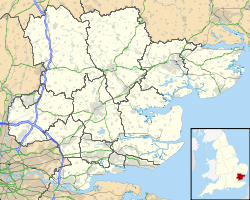| Carver Barracks | |
|---|---|
| Debden, Uttlesford | |
 Entrance to Carver Barracks | |
| Site information | |
| Type | Barracks |
| Owner | Ministry of Defence |
| Operator | |
| Location | |
| Coordinates | 51°59′15″N0°17′03″E / 51.98757°N 0.28416°E |
| Site history | |
| Built | 1935–1937 |
| Built for | War Office |
| In use | 1975–present |
| Garrison information | |
| Occupants | 33 Engineer Regiment and 35 Engineer Regiment |
Carver Barracks is a British Army base on the former site of RAF Debden, approximately 1 mile north of the village of Debden, in Essex. The nearest town is Saffron Walden. It is occupied by explosive ordnance disposal & search regiments of the Royal Engineers.
